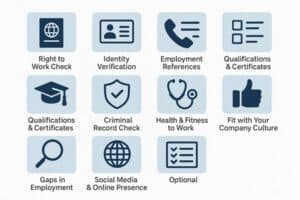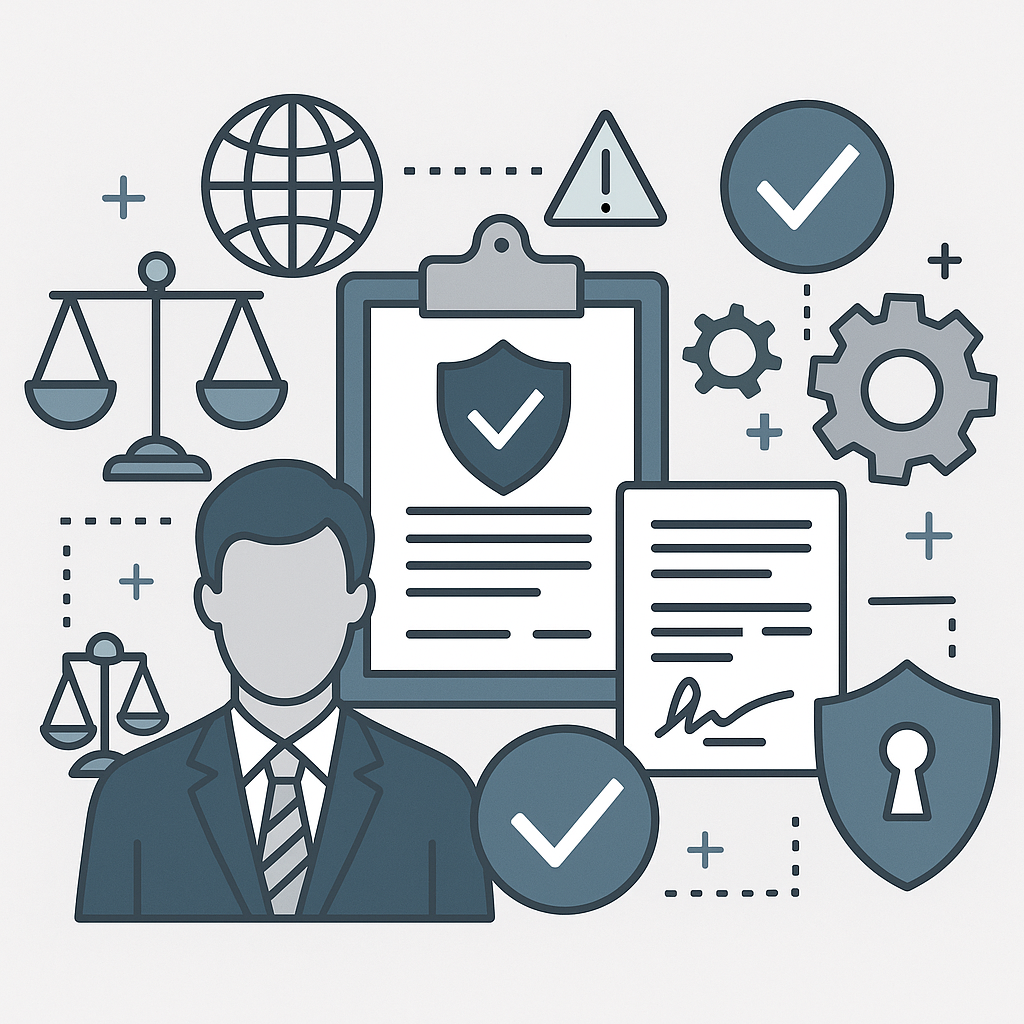
Hiring someone new? Whether you’re bringing in your first employee or adding to an established team, it’s essential to cover your bases before making that all-important offer. A well-structured pre-employment checklist ensures you’re hiring smart, staying compliant, and avoiding costly mistakes. Here’s a quick reference guide to what should always be on your radar.
1. Right to Work Check
Before anything else, make sure your candidate is legally allowed to work in the UK. This isn’t just best practice—it’s a legal requirement. What to do:
- Ask for original documents (e.g. passport, biometric residence permit).
- Check the documents are genuine and belong to the person to reduce hiring risks.
- Keep a clear copy and record the date you checked it.
2. Identity Verification
Verifying identity helps protect your business from fraud and ensures you’re hiring who you think you are. What to check:
- Passport or driving licence.
- Proof of address (like a utility bill or bank statement).
- Cross-check name, photo, and date of birth with other documents.
3. Employment References
A quick call or email to previous employers can offer insight into your candidate’s work ethic, reliability, and attitude. What to ask:
- Dates of employment.
- Job title and responsibilities.
- Reason for leaving and overall performance.
4. Qualifications & Certificates
If the role requires specific qualifications—especially for roles in healthcare, education, or technical fields—you need to confirm they’re real. What to verify:
- Degree certificates, vocational training, industry accreditations.
- Professional memberships (e.g. CIPD, ACCA).
- Use awarding bodies or verification services if needed.
5. Criminal Record Check (If Applicable)
Not every role requires one, but if you’re hiring for positions involving vulnerable people, finances, or sensitive data, a DBS (Disclosure and Barring Service) check is essential. Types of checks:
- Basic (any role)
- Standard (roles with some responsibility)
- Enhanced (roles with vulnerable groups)
6. Health & Fitness to Work (Where Relevant)
In some industries—like construction, transport, or care—it’s important to check that the candidate is physically and mentally fit for the role. You might need:
- A medical questionnaire.
- Occupational health screening.
7. Gaps in Employment
It’s worth asking about any long or unexplained gaps in a CV. Often there’s a reasonable explanation, but it’s best not to assume. How to approach:
- Ask about any breaks in a friendly, open way.
- Look for consistency and honesty in their response.
8. Social Media & Online Presence (Optional but Useful)
While not essential, a quick scan of public profiles can give you a sense of someone’s communication style, professionalism, or red flags. Tip: Stick to public info only and avoid making hiring decisions based on opinions or lifestyle.
9. Fit with Your Company Culture
It’s easy to overlook, but hiring someone who aligns with your company values can make all the difference. How to assess:
- Ask value-based interview questions.
- Observe how they interact with different team members.
- Don’t rely solely on a “gut feeling”—look for behaviour that supports a good match.
10. Final Paperwork & Offer Letter
Once you’ve ticked all the boxes, make it official. Checklist:
- Written offer letter
- Employment contract
- Job description
- Starter form (e.g. HMRC Starter Checklist)
- Company policies and procedures (health & safety, data protection, etc.)
Why Pre-Employment Checks Should be Done by Professionals
You’ve decided that pre-employment checks are a way to safeguard your business. You’ve been thinking about creating a process yourself. However, have you really thought this through? Know that most companies choose to hire professionals and use a pre-employment checks service. Not only is this a convenient way to hire candidates, but it’s also safer. Let’s take a closer look at the benefits of this approach and why you should go down this road.
For Efficiency
If you’ve never carried out pre-employment checks before, you might not realise how time-consuming it is. This is particularly true when you don’t have experience. If you’re looking to hire quickly and integrate this into your team sooner rather than later, you are better off choosing a professional pre-employment check. Professionals know how to carry out thorough checks quickly. What’s more, it will take the pressure off your shoulders.
To Reduce Bias
You might not realise it, but when you’re carrying out checks, you could have bias in what you’re looking at. This can impact the people you hire. However, for consistency and fairness, professionals don’t do this. Instead, they have a procedure they follow, which has been tried and tested. This allows quality hires.
To Dive Deeper
Professionals have more training and experience, which allows them to use deeper checks on candidates. This means that they can get the full story, and it makes sure you’re hiring people you can trust. This is a lot more than you can do when you’re attempting checks on your own. Therefore, know that it’s safer to hire professionals.
Conclusion
Having a clear pre-employment checklist not only protects your business—it helps you hire with confidence. It ensures a smoother onboarding process and sets the tone for a professional, organised working relationship. Whether you’re a growing business or just getting started, ticking off these essentials is a smart move for building a strong, reliable team.






